143 Top Rated Alcohol and Drug Rehabs in Nebraska 2025
The treatment centers presented on this page have been evaluated and ranked based on publicly accessible Google Reviews data to reflect facilities with the highest community ratings in Nebraska.
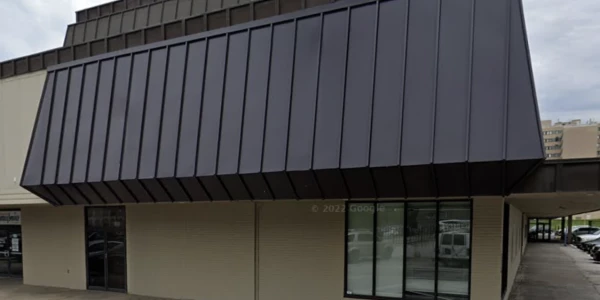



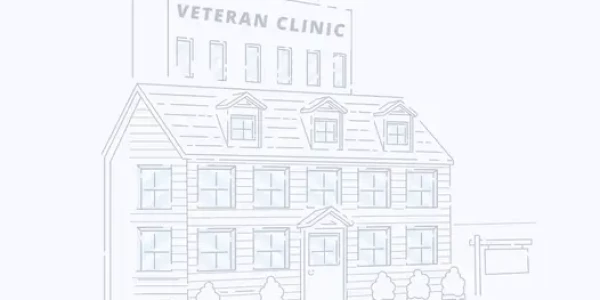
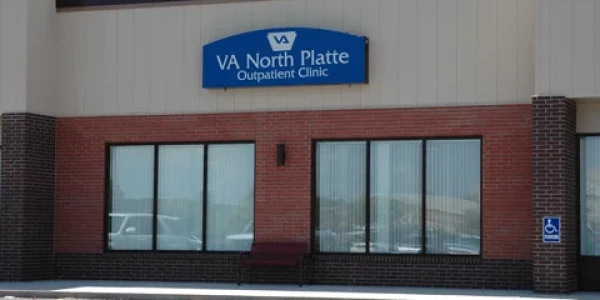




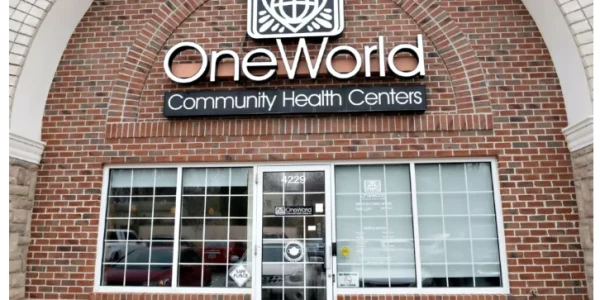

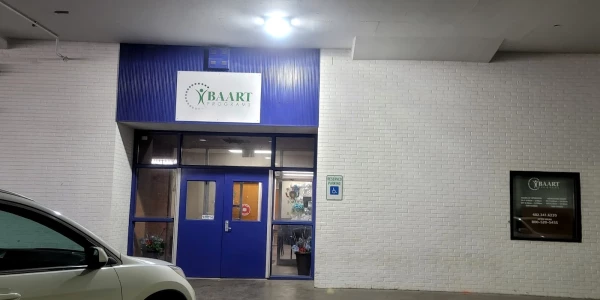

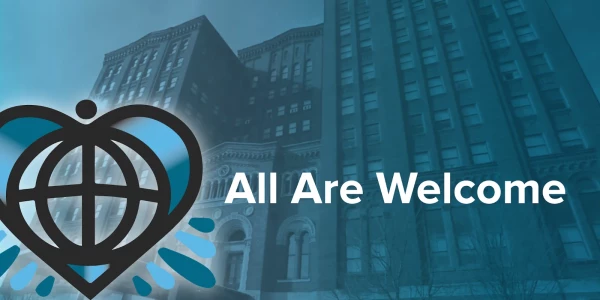




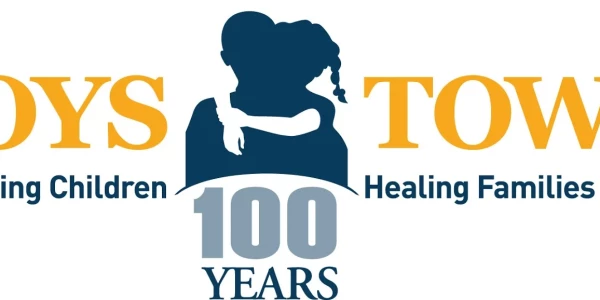

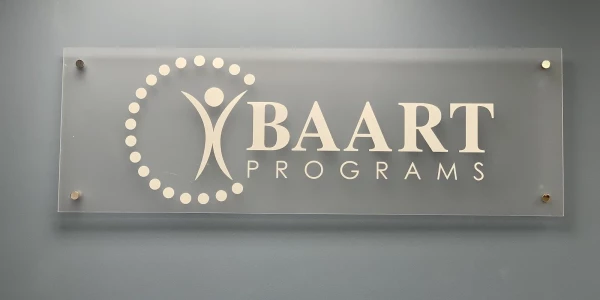


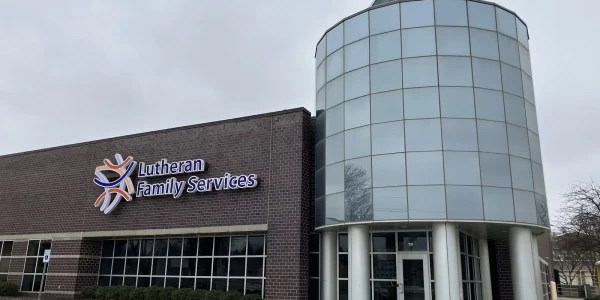

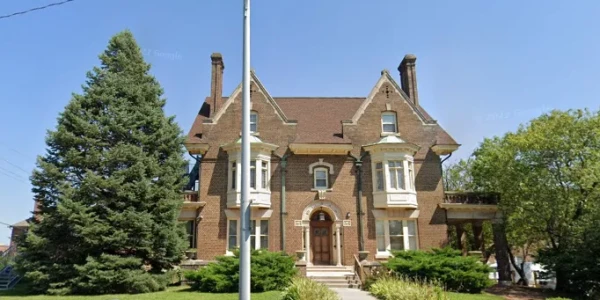



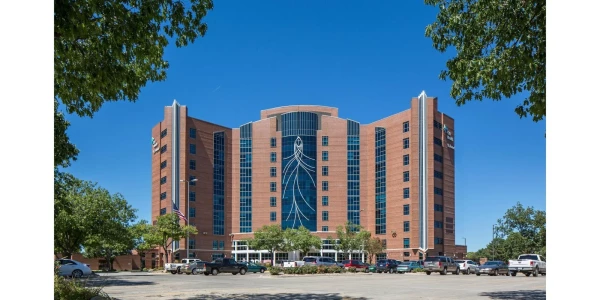
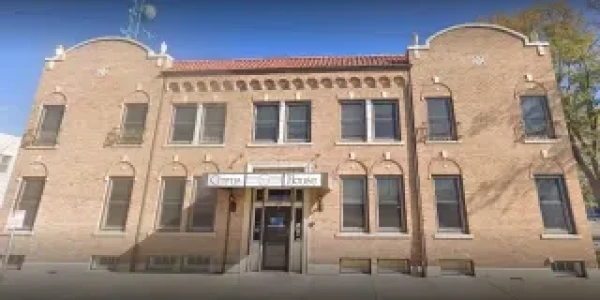
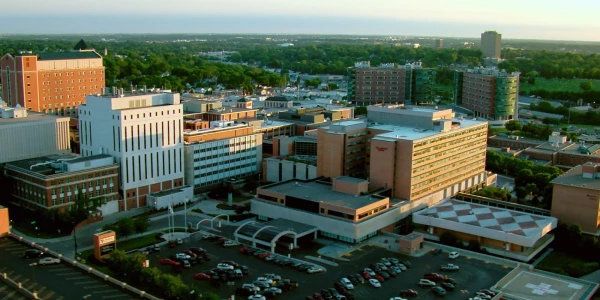
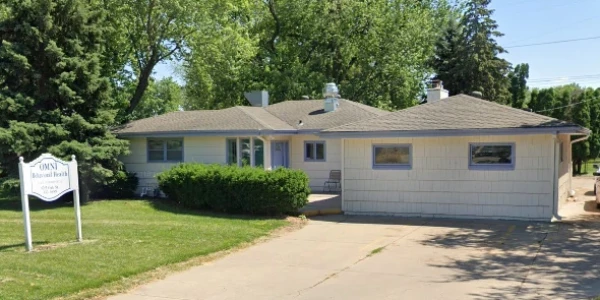

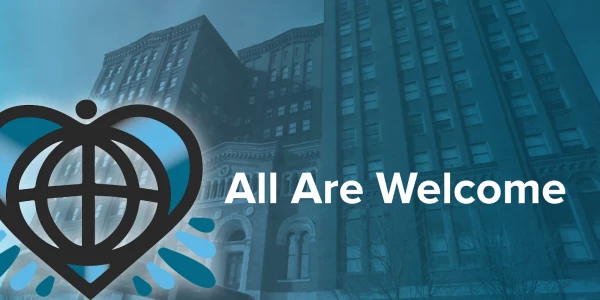
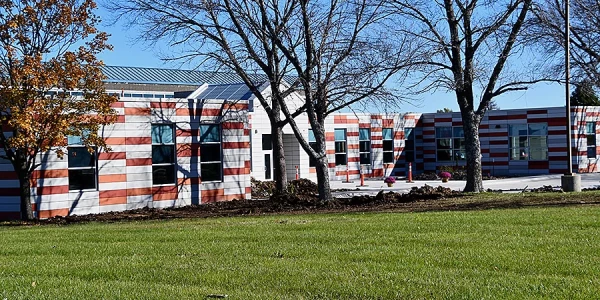





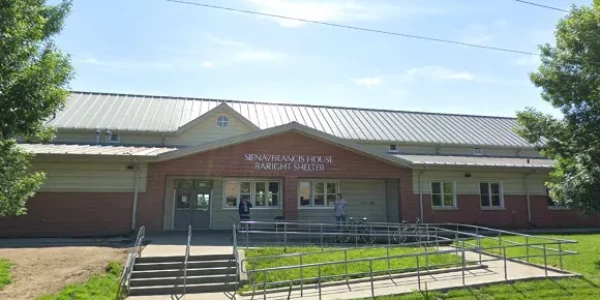
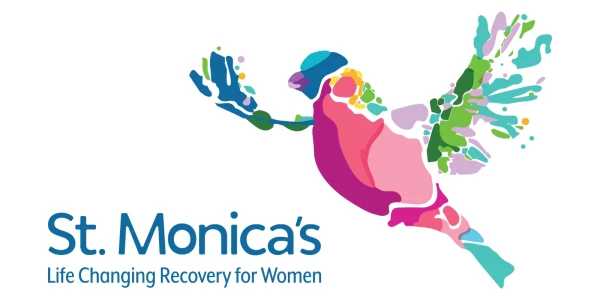

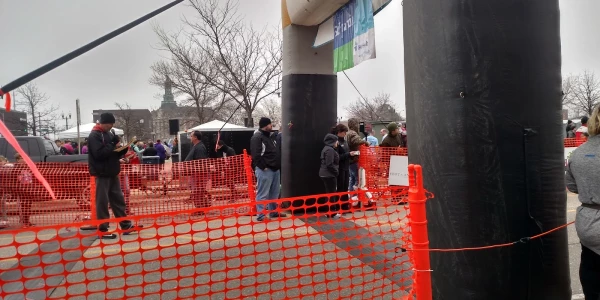

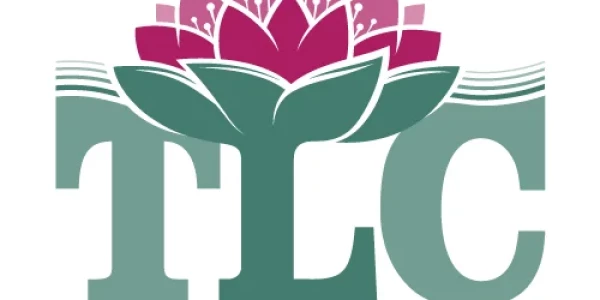


Substance abuse and Mental Health facilities Report for Nebraska
40th
Cheapest To Most Expensive State Rank
137
Substance Abuse Facilities
5,868
Number of Patients Annually
4,982
Annual Enrollments
$9M
Spent on Outpatient Services (Million)
$1,855.00
Avg Outpatient Rehab Cost
883
Residential Admissions
$51M
Spent on Residential Treatment (Million)
$58,777.00
Residential Rehab Pay (Up To)
3
Total Patients
3
Free Drug Rehab Facilities
Alcoholism, Drug Abuse, Mental Health, and Treatment in Nebraska
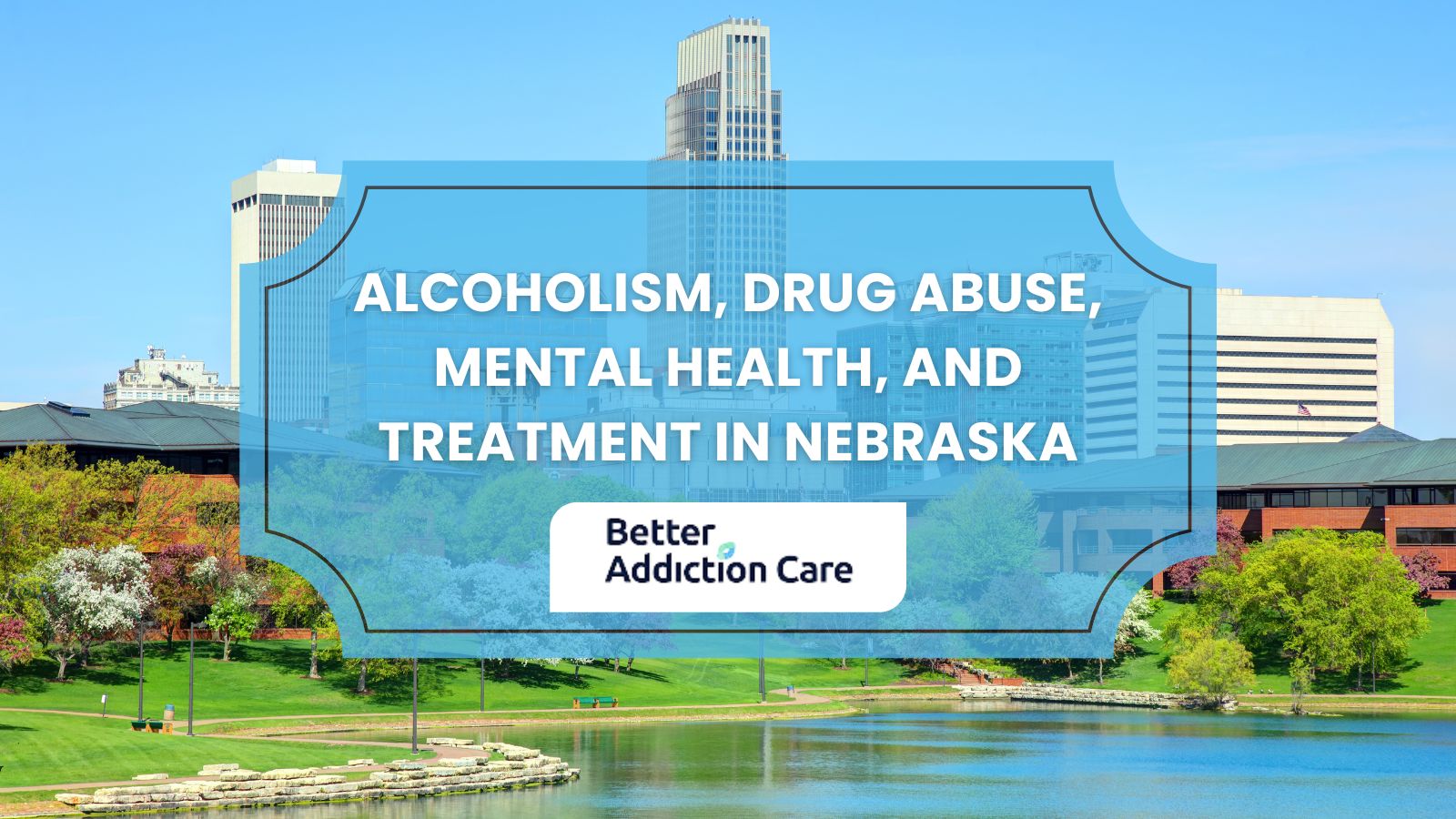
What are the main addictions people in Nebraska suffer from?
The main addiction people in Nebraska suffer from include;
- Alcohol Addiction: 178,000 individuals (10.96% of the population) experienced alcohol addiction in the past year. 95,000 (53%) Men are more likely than 83,000 (46%) women have been affected by Alcohol Addiction
- Marijuana Addiction: 258,000 individuals (15.86%) used marijuana in the past year. 145,000 (56.2%) Men are more likely than 113,000 (43%) women have been affected by Marijuana Addiction
- Tobacco Addiction: 305,000 individuals (18.77%) used tobacco products in the past month. 189,000 (62%) Men are more likely than 116,000 (38%) women have been affected by Tobacco Addiction
- Prescription Pain Reliever Addiction: 42,000 individuals (2.59%) misused prescription pain relievers in the past year. 25,000 (60%) Men are more likely than 16,500 (39%) women have been affected by Pain Reliever Addiction
- Cocaine Addiction: 25,000 individuals (1.51%) used cocaine in the past year. 13,000 (52%) Men are more likely than 12,000 (48%) women have been affected by Cocaine Addiction
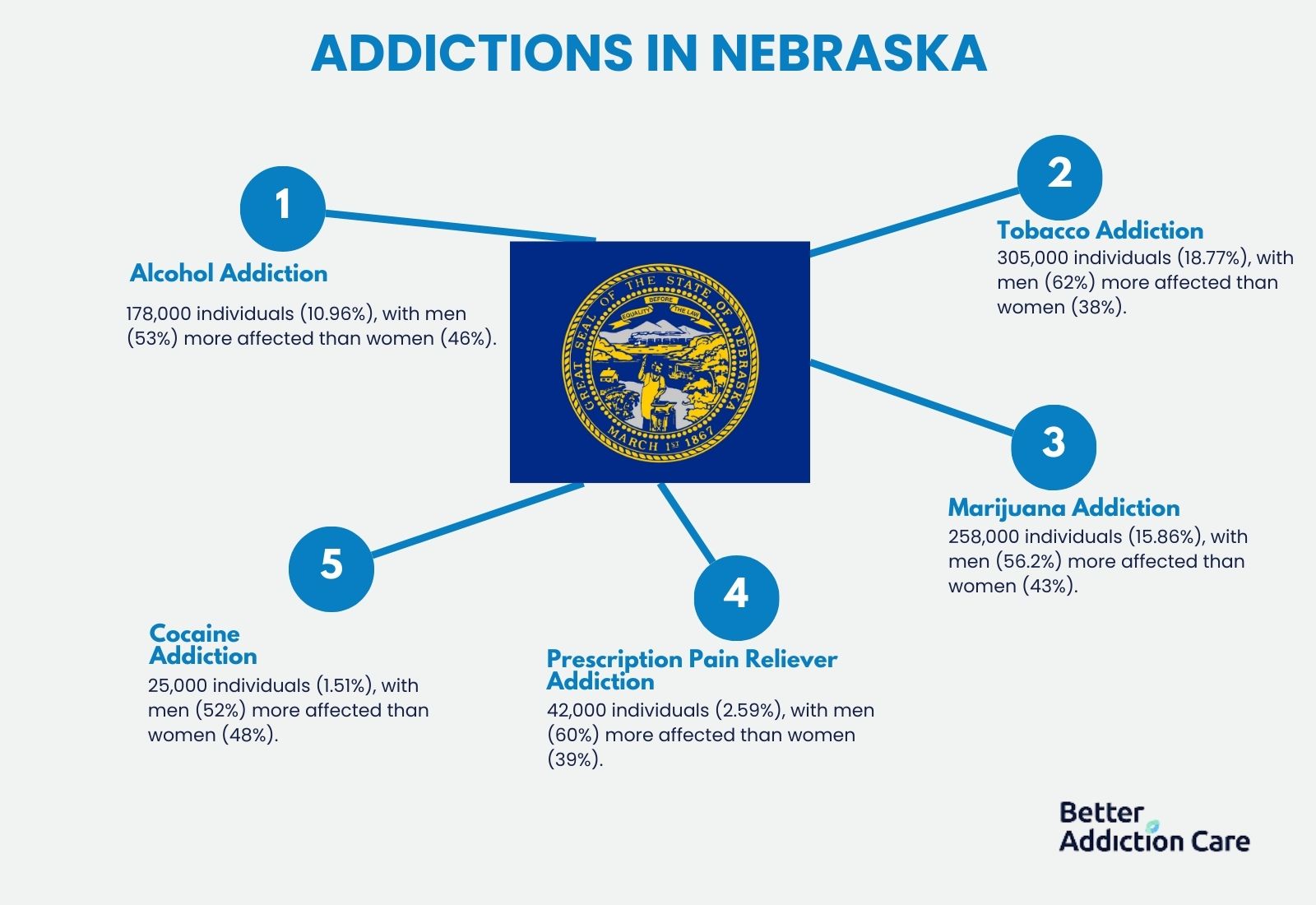
What is the cost of rehab centers in Nebraska?
The cost of rehab centers in Nebraska is $58,777, which equates to 79%. Long-term inpatient rehab programs, which extend beyond 30 days, cost $51,867, representing a decrease of $6,910 or 12% below the average. Outpatient treatment programs are typically the most affordable, with costs averaging $8,618, a reduction of $50,159, or 85%, from the state average.
The cost of rehab centers in Nebraska vary significantly depending on the type of addiction and specific treatment program. Medical detoxification, often required for severe substance dependencies, is the most expensive option, averaging $144,907, an increase of $86,130, or about 146%, compared to the average.
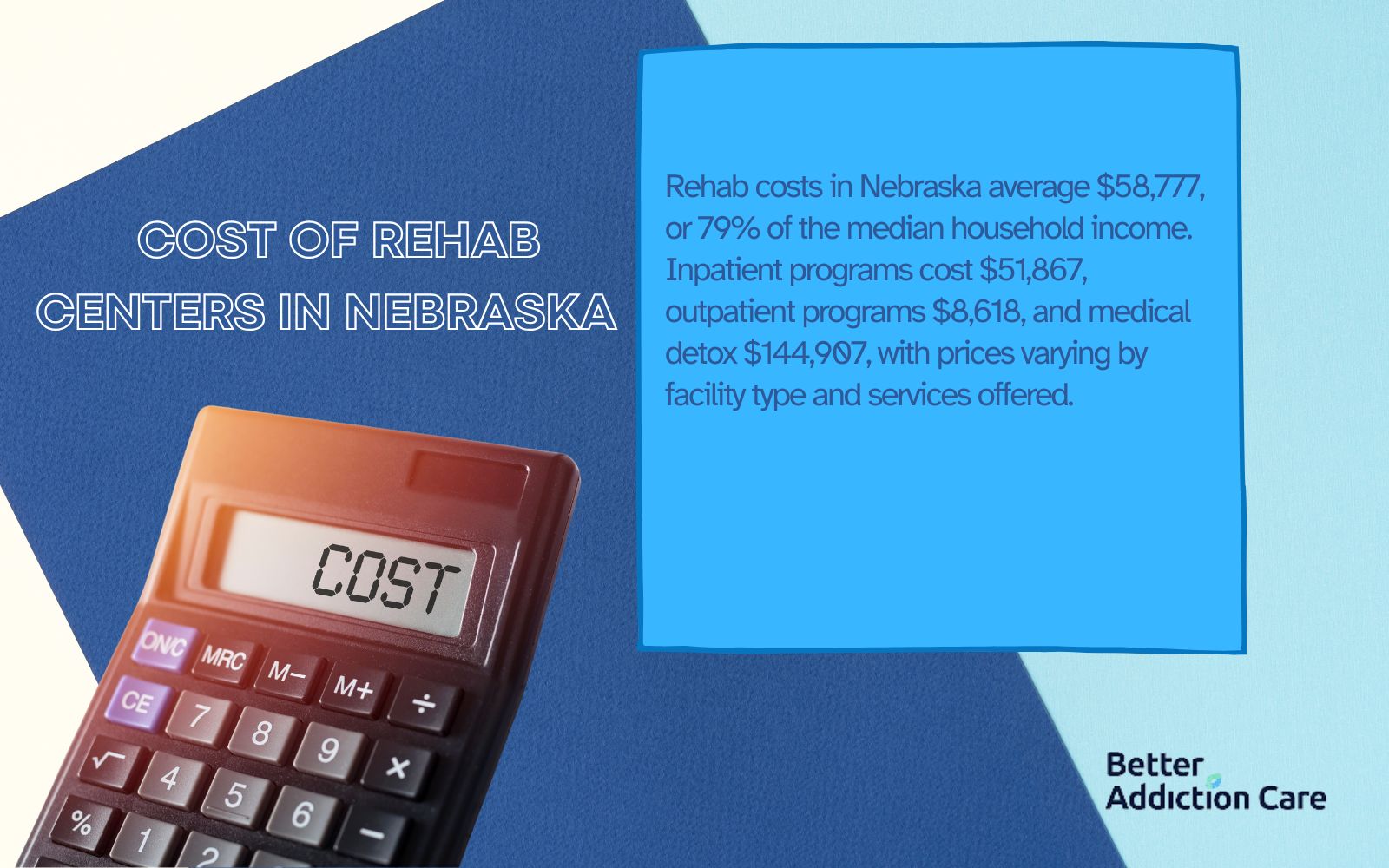
Nebraska's median household income is $74,590, the rehab cost constitutes 79% of a family's annual earnings, highlighting the financial strain treatment imposed on many households. The cost of rehab centers in Nebraska also vary by the type of rehab center, with luxury or private facilities charging higher fees for enhanced services and amenities, while state-funded or non-profit centers may provide more affordable or even free options based on eligibility and available resources.
What is the cost of LGBTQ+ rehab centers in Nebraska?
The cost of LGBTQ+ rehab centers in Nebraska is $56,087, which equates to 75%. Long-term inpatient rehab programs, which extend beyond 30 days, cost $51,867, representing a decrease of $6,910 or 12% below the average. Outpatient treatment programs are typically the most affordable, with costs averaging $8,618, a reduction of $50,159, or 85%, from the state average.
The cost of LGBTQ+ rehab centers in Nebraska vary significantly depending on the type of addiction and specific treatment program. Medical detoxification, often required for severe substance dependencies, is the most expensive option, averaging $144,907, an increase of $86,130, or about 146%, compared to the average.
Nebraska's median household income is $74,590, the LGBTQ+ rehab cost constitutes 75% of a family's annual earnings, highlighting the financial strain treatment imposed on many households. The cost of LGBTQ+ rehab centers in Nebraska also vary by the type of rehab center, with luxury or private facilities charging higher fees for enhanced services and amenities, while state-funded or non-profit centers may provide more affordable or even free options based on eligibility and available resources.
What is the cost of Faith-Based rehab centers in Nebraska?
The cost of Faith-Based rehab centers in Nebraska is $55,000, which equates to 73%. Long-term inpatient rehab programs, which extend beyond 30 days, cost $51,867, representing a decrease of $6,910 or 12% below the average. Outpatient treatment programs are typically the most affordable, with costs averaging $8,618, a reduction of $50,159, or 85%, from the state average.
The cost of Faith-Based rehab centers in Nebraska vary significantly depending on the type of addiction and specific treatment program. Medical detoxification, often required for severe substance dependencies, is the most expensive option, averaging $144,907, an increase of $86,130, or 146%, compared to the average.
Nebraska's median household income is $74,590, the Faith-Based rehab cost constitutes 73% of a family's annual earnings, highlighting the financial strain treatment imposed on many households. The cost of Faith-Based rehab centers in Nebraska also vary by the type of rehab center, with luxury or private facilities charging higher fees for enhanced services and amenities, while state-funded or non-profit centers may provide more affordable or even free options based on eligibility and available resources.
What is the cost of Men-Only rehab centers in Nebraska?
The cost of Men-Only rehab centers in Nebraska is $55,500, which equates to 74%. Long-term inpatient rehab programs, which extend beyond 30 days, cost $51,867, representing a decrease of $6,910 or 12% below the average. Outpatient treatment programs are typically the most affordable, with costs averaging $8,618, a reduction of $50,159, or 85%, from the state average.
The cost of Men-Only rehab centers in Nebraska vary significantly depending on the type of addiction and specific treatment program. Medical detoxification, often required for severe substance dependencies, is the most expensive option, averaging $144,907, an increase of $86,130, or about 146%, compared to the average.
Nebraska's median household income is $74,590, the Men-Only rehab cost constitutes 74% of a family's annual earnings, highlighting the financial strain treatment imposed on many households. The cost of Men-Only rehab centers in Nebraska also vary by the type of rehab center, with luxury or private facilities charging higher fees for enhanced services and amenities, while state-funded or non-profit centers may provide more affordable or even free options based on eligibility and available resources.
What is the cost of Women-Only rehab centers in Nebraska?
The cost of Women-Only rehab centers in Nebraska is $56,777, which equates to 76%. Long-term inpatient rehab programs, which extend beyond 30 days, cost $51,867, representing a decrease of $6,910 or 12% below the average. Outpatient treatment programs are typically the most affordable, with costs averaging $8,618, a reduction of $50,159, or 85%, from the state average.
The cost of Women-Only rehab centers in Nebraska vary significantly depending on the type of addiction and specific treatment program. Medical detoxification, often required for severe substance dependencies, is the most expensive option, averaging $144,907, an increase of $86,130, or 146%, compared to the average.
Nebraska's median household income is $74,590, the Women-Only rehab cost constitutes 76% of a family's annual earnings, highlighting the financial strain treatment imposed on many households. The cost of Women-Only rehab centers in Nebraska also vary by the type of rehab center, with luxury or private facilities charging higher fees for enhanced services and amenities, while state-funded or non-profit centers may provide more affordable or even free options based on eligibility and available resources.
What is the cost of Teen rehab centers in Nebraska?
The cost of Teen rehab centers in Nebraska is $57,000, which equates to 76%. Long-term inpatient rehab programs, which extend beyond 30 days, cost $51,867, representing a decrease of $6,910 or 12% below the average. Outpatient treatment programs are typically the most affordable, with costs averaging $8,618, a reduction of $50,159, or 85%, from the state average.
The cost of Teen rehab centers in Nebraska vary significantly depending on the type of addiction and specific treatment program. Medical detoxification, often required for severe substance dependencies, is the most expensive option, averaging $144,907, an increase of $86,130, or about 146%, compared to the average.
Nebraska's median household income is $74,590, the Teen rehab cost constitutes 76% of a family's annual earnings, highlighting the financial strain treatment imposed on many households. The cost of Teen rehab centers in Nebraska also vary by the type of rehab center, with luxury or private facilities charging higher fees for enhanced services and amenities, while state-funded or non-profit centers provide more affordable or even free options based on eligibility and available resources.
What is the cost of Young Adult rehab centers in Nebraska?
The cost of Young Adult rehab centers in Nebraska is $50,900, which equates to 68%. Long-term inpatient rehab programs, which extend beyond 30 days, cost $51,867, representing a decrease of $6,910 or 12% below the average. Outpatient treatment programs are typically the most affordable, with costs averaging $8,618, a reduction of $50,159, or 85%, from the state average.
The cost of Young Adult rehab centers in Nebraska vary significantly depending on the type of addiction and specific treatment program. Medical detoxification, often required for severe substance dependencies, is the most expensive option, averaging $144,907, an increase of $86,130, or about 146%, compared to the average.
Nebraska's median household income is $74,590, the Young Adult rehab cost constitutes 68% of a family's annual earnings, highlighting the financial strain treatment imposed on many households. The cost of Young Adult rehab centers in Nebraska also vary by the type of rehab center, with luxury or private facilities charging higher fees for enhanced services and amenities, while state-funded or non-profit centers provide more affordable or even free options based on eligibility and available resources.
What is the cost of Luxury Rehab centers in Nebraska?
The cost of Luxury rehab centers in Nebraska is $80,000, which equates to 112%. Long-term inpatient rehab programs, which extend beyond 30 days, cost $51,867, representing a decrease of $6,910 or 12% below the average. Outpatient treatment programs are typically the most affordable, with costs averaging $8,618, a reduction of $50,159, or 85%, from the state average.
The cost of Luxury rehab centers in Nebraska vary significantly depending on the type of addiction and specific treatment program. Medical detoxification, often required for severe substance dependencies, is the most expensive option, averaging $144,907, an increase of $86,130, or about 146%, compared to the average.
Nebraska's median household income is $74,590, the Luxury rehab cost constitutes 112% of a family's annual earnings. The cost of Luxury rehab centers in Nebraska also vary by the type of rehab center, with luxury or private facilities charging higher fees for enhanced services and amenities, while state-funded or non-profit centers may provide more affordable or even free options based on eligibility and available resources.
What is the cost of Dual Diagnosis rehab centers in Nebraska?
The cost of Dual Diagnosis rehab centers in Nebraska is $51,970, which equates to 70%. Long-term inpatient rehab programs, which extend beyond 30 days, cost $51,867, representing a decrease of $6,910 or 12% below the average. Outpatient treatment programs are typically the most affordable, with costs averaging $8,618, a reduction of $50,159, or 85%, from the state average.
The cost of Dual Diagnosis rehab centers in Nebraska vary significantly depending on the type of addiction and specific treatment program. Medical detoxification, often required for severe substance dependencies, is the most expensive option, averaging $144,907, an increase of $86,130, or about 146%, compared to the average.
Nebraska's median household income is $74,590, the Dual Diagnosis rehab cost constitutes 70% of a family's annual earnings, highlighting the financial strain treatment imposed on many households. The cost of Dual Diagnosis rehab centers in Nebraska also vary by the type of rehab center, with luxury or private facilities charging higher fees for enhanced services and amenities, while state-funded or non-profit centers may provide more affordable or even free options based on eligibility and available resources.
Is drug abuse and addiction a problem in Nebraska?
Yes, drug abuse and addiction is a problem in Nebraska. Firstly, Nebraska has experienced a notable increase in drug overdose deaths, particularly involving synthetic opioids like fentanyl. In 2024, fentanyl and other synthetic opioids were implicated in 45% of total overdose deaths in Nebraska, with rates of fentanyl-involved deaths increasing 4.6 times between 2014 and 2024. Secondly, methamphetamine use has surged, with overdose death rates involving this substance rising 2.7 times between 2020 and 2024. Thirdly, the prevalence of illicit drug use among Nebraskans aged 12 and older was 11.78% in 2022-2024, indicating a substantial portion of the population engaged in drug use. Over the years, these statistics have shown an upward trend, underscoring the growing challenge of drug abuse and addiction in the state of Nebraska.
Is alcoholism a problem in Nebraska?
Yes, alcoholism is a problem in Nebraska. Firstly, the state of Nebraska exhibits a high prevalence of alcohol consumption among adults; in 2022-2024, 51.73% of individuals aged 12 and older reported alcohol use in the past month, with 25.17% engaging in binge drinking during the same period. Secondly, underage drinking remains a concern; in 2024, 15.80% of individuals aged 12 to 20 reported alcohol use in the past 30 days, and 8.38% reported binge drinking. Thirdly, the economic impact of alcohol misuse is substantial, the cost to Nebraska is at $5.63 billion, encompassing healthcare expenses, lost productivity, and other related costs.
Over the years, these statistics have shown concerning trends, indicating that alcoholism continues to be a pressing public health challenge in the state of Nebraska.
Is Mental Health a problem in Nebraska?
Yes, mental health is a problem in Nebraska. Firstly, a substantial portion of the population is affected; 257,000 adults in Nebraska have a mental health condition, which is more than five times the population of Grand Island. Secondly, access to mental health services is limited; 88 of Nebraska's 93 counties are designated as having a shortage of mental health providers, with 29 counties lacking any behavioral health provider. Thirdly, the COVID-19 pandemic has exacerbated mental health challenges, 33.8% of adults in Nebraska reported symptoms of anxiety or depression, and 21.5% were unable to access needed counseling or therapy.
Over the years, these issues have persisted, highlighting the ongoing need for improved mental health resources and services in the state of Nebraska.
Can you travel to Nebraska for rehab?
Yes, you can travel to Nebraska for rehab, and there are several compelling reasons to consider the state of Nebraska for addiction treatment. Nebraska offers a serene and peaceful environment, which is ideal for individuals seeking to focus on recovery away from the distractions of urban life. The state of Nebraska is known for its strong sense of community and Midwestern hospitality, which often extends to personalized care and supportive treatment approaches in its rehab centers. Nebraska has a relatively low cost of living compared to many other states, which translate to more affordable treatment options without compromising the quality of care. These factors, combined with the availability of evidence-based programs tailored to individual needs, make Nebraska a unique and effective choice for those seeking recovery.
Can addiction be treated in Nebraska?
Yes, addiction can be treated in Nebraska, and there are three key reasons why it is an effective location for recovery. Nebraska offers a wide range of accredited rehab centers that provide evidence-based treatments, including medical detox, therapy, and aftercare services, ensuring comprehensive care for various substance use disorders. Nebraska also has a network of community-based programs and support groups, such as Alcoholics Anonymous and Narcotics Anonymous, which play a critical role in fostering long-term recovery and relapse prevention.
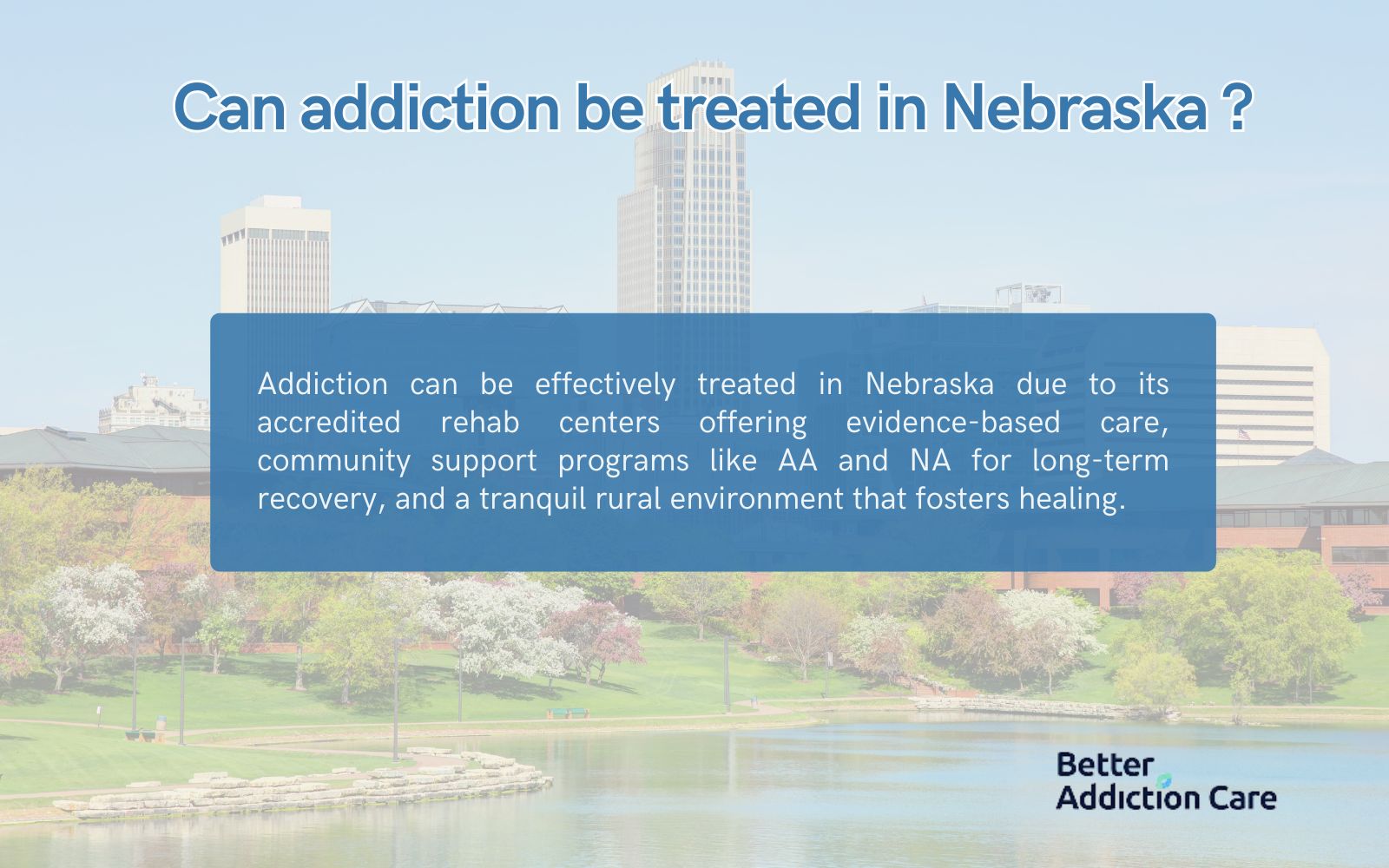
Nebraska’s rural and tranquil environment provides an ideal setting for individuals to focus on healing, away from the stresses and triggers often associated with urban areas. These factors collectively make Nebraska a viable and supportive place for addiction treatment.
What is the state of Nebraska?
The state of Nebraska is in the Midwestern United States, bordered by South Dakota to the north, Iowa to the east, Missouri to the southeast, Kansas to the south, Colorado to the southwest, and Wyoming to the west. Nebraska's population is 1,988,700, with a nearly equal gender distribution: about 51.8% female and 48.2% male. Economically, Nebraska ranks 35th among U.S. states in terms of economic output, reflecting a moderate economic standing.
Nebraska's economy is diverse, with strengths in agriculture, manufacturing, and energy production, contributing to its overall financial health. However, economic disparities exist, particularly between urban and rural areas, affecting the distribution of wealth and resources within the state of Nebraska.
What is the population of Nebraska?
The population of Nebraska is 1,988,700, with a nearly even gender distribution of 50.3% females (999,000) and 49.7% males (989,700). The population spans various age groups, with 6.6% (130,742) under the age of 5 and a similar 6.6% (132,038) in the 5 to 9 age range. Individuals aged 10 to 14 comprise 6.8% (134,239), while those aged 15 to 19 account for 6.6% (131,348). The 20 to 24 age group makes up 6.8% (135,919), and the largest demographic is 25 to 34-year-olds, representing 12.8% (255,441) of the population. Those aged 35 to 44 follow closely at 12.1% (239,612). The 45 to 54 group accounts for 11.1% (220,472), and the 55 to 59 age range represents 6.1% (121,405). People aged 60 to 64 make up 6.0% (120,579), while individuals aged 65 to 74 constitute 8.6% (171,887). Older age groups include 4.4% (87,155) aged 75 to 84 and 2.2% (42,989) aged 85 and older. This distribution highlights Nebraska's diverse population across all age groups, with notable proportions in both younger and middle-aged demographics.
What is the income of people from Nebraska?
The income of people from Nebraska is $71,347, per capita personal income. Nebraska's median household income stood at $74,590.In Nebraska, income levels vary across different age groups and between genders. Householders aged 45 to 64 have the highest median household income at $91,848, followed by those aged 25 to 44 with $84,608. Householders under 25 years have the lowest median income at $42,176. Gender disparities are evident in income statistics. For all workers aged 15 and older, the median income is $46,342 for males and $30,872 for females, indicating that women earn 67 cents for every dollar earned by men. Among full-time, year-round workers, males have a median income of $60,853, while females earn $50,037, narrowing the gap to 82 cents on the dollar.


